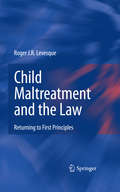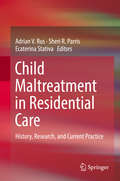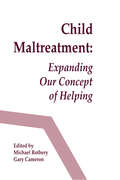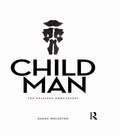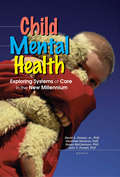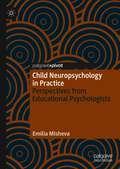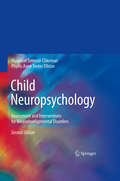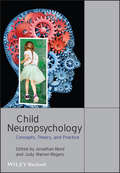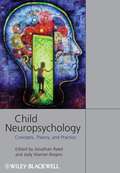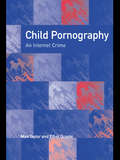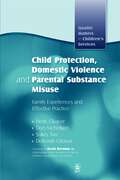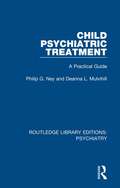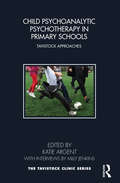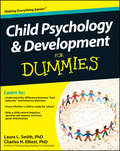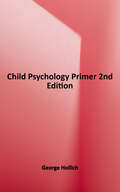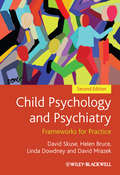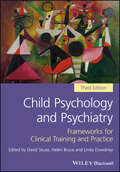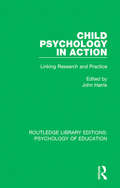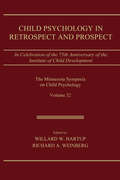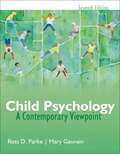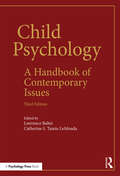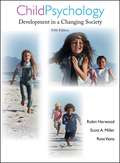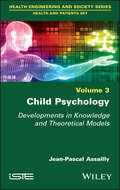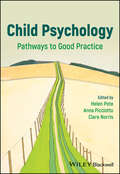- Table View
- List View
Child Maltreatment and the Law: Returning to First Principles
by Roger J.R. LevesqueDramatic cases of child abuse and neglect are featured with tragic regularity in the news. The stories vividly demonstrate both the urgent need for improved child protection services and the unwieldiness and ineffectiveness of the systems charged with the task. To complicate matters further, the original intent of child welfare policy is becoming increasingly obscured as legal responses to child maltreatment become more complex, intrusive, and even contradictory. Fueled by a consistent narrative and a lucid ethical stance, Child Maltreatment and the Law analyzes the increasing role legal systems play in family life and traces rapidly evolving legal concepts as they apply to child protection. This unique volume helps readers: (1) Navigate the various layers of legal regulation - federal and state - involved in child protection and family life. (2) Identify variations and discrepancies in definitions of maltreatment and legal responses. (3) Critique the relationships and boundary disputes between the criminal and civil justice systems and agencies dedicated to children's welfare. (4) Analyze controversies (e.g., removing children from maltreating families) and other prime areas for possible reform. Child Maltreatment and the Law is a must-read for psychologists, developmentalists, sociologists, social workers, criminologists, and researchers focusing on family life as well as policymakers and advocates working within the legal system. The book is particularly useful for courses relating to child welfare law or child abuse and neglect.
Child Maltreatment in Residential Care: History, Research, and Current Practice
by Sheri R. Parris Adrian V. Rus Ecaterina StativaThis data-rich volume reviews short- and long-term consequences of residential or institutional care for children across the globe as well as approaches to reducing maltreatment. Up-to-date findings from a wide range of developing and developed countries identify forms of abuse and neglect associated with institutionalization and their effects on development and pathology in younger children, adolescents, and alumni. The sections on intervention strategies highlight the often-conflicting objectives facing professionals and policymakers balancing the interests of children, families, and facilities. But despite many national and regional variations, two themes stand out: the universal right of children to live in safety, and the ongoing need for professionals and community to ensure this safety. Included among the topics: Maltreatment and living conditions in long-term residential institutions for children Outcomes from institutional rearing Recommendations to improve institutional living Historical, political, socio-economic, and cultural influences on Child Welfare Systems Latin American and the Caribbean, African, Asian, Middle-Eastern, Western and Eastern European countries and the United States of America are presented. Child Maltreatment in Residential Care will inform psychology professionals interested in the role of residential care in the lives of children, and possibilities for improved outcomes. It will also interest social workers and mental health practitioners and researchers seeking evidence-based interventions for families adopting children from residential care.
Child Maltreatment: Expanding Our Concept of Helping
by Gary Cameron Michael RotheryRecognizing child maltreatment as a complex phenomenon requiring multifaceted responses, this volume provides a current and comprehensive assessment of the problem, and argues for an expanded conception of helping on the part of those who work with maltreated children, their families, and their communities. Contributions follow a general outline that addresses current theory and models of practice, and empirical knowledge regarding the problem, intervention, and outcomes. Presenting and up-to- date and encompassing view of how to combat child abuse and neglect, this book discusses the concerns of service providers as well as academics. All the prevalent ways of responding to child maltreatment are addressed, and each is discussed in terms of theory, implementation and evidence for its effectiveness. For use as an undergraduate or graduate level text for courses in child welfare, sociology, family studies, and community psychology. This text would also be insightful for professionals, academics, and policymakers concerned with child welfare.
Child Man: The Selfless Narcissist
by Ashok MalhotraThere is a part of us which neither listens to the voice of reason nor submit easily to social/moral conventions. Like a child, it relentlessly pursues whatever catches its fancy and keeps playing with fire. It can either help us actualize our heroic potential or put us on the road to self-destruction. Perhaps the key to this difference lies in what we do with our emotional/psychic wounds which are a necessary part of the growth process. The book explores the inner landscape of this part of our psyche through the mythological figures of Balarama, Duryodhana and Bhima. It also examines the present day context of human existence which has ironically enhanced both our prowess and helplessness and thereby pushed this part of ourselves into our psychic/social underbelly.
Child Mental Health: Exploring Systems of Care in the New Millennium
by John Y Powell David Dosser Dorothea Handron Susan Mccammon Sandra A. SpencerUse these system-of-care concepts to better serve children with serious emotional problems and their families!Providing services to children with emotional problems and their families continues to be a major challenge for social workers, family therapists, child mental health advocates, and psychologists in the new century. This valuable book addresses that challenge, detailing theory, principles, and application issues from the vantage points of both consumers and service providers. System-of-care values and practices were developed to address these concerns and meet the needs of these children and families, who tend to receive either no services at all or services that are far too restrictive, at a large cost to the organization providing the services.Child Mental Health: Exploring Systems of Care in the New Millennium identifies salient issues and offers suggestions for addressing the complexities of providing services for these troubled families. It also provides hope and encouragement for family members and professionals by identifying roles and practices that are effective in building collaborative community-based services.This book takes an incisive look at: the benefits and difficulties of partnering between practitioners and families the need for and benefits of partnering between practitioners of various disciplines within the system of care a working model of a wraparound process (the hallmark of the system of care) barriers that prevent effective wraparound services and what causes them the need to help social workers learn parent partnering skills the roles that families can play in the system of care the need for specialized training so that practitioners can learn to assess, understand, and integrate a family's spiritual beliefs into the system of care the development of an interdisciplinary, collaborative practice course at East Carolina University experiential training and shared-classroom experiences for studentsChild Mental Health: Exploring Systems of Care in the New Millennium is a tool that will aid practitioners and consumers alike as they shift their point of view from the provider-as-expert paradigm to one of building partnerships.
Child Neuropsychology in Practice: Perspectives from Educational Psychologists
by Emilia MishevaThis book examines the relationship between educational psychology and neuropsychology. It is based on the findings from two original research studies – a national survey looking at educational psychologists’ views on neuropsychology; and interviews exploring the specialist role of educational psychologists in neuropsychological settings. The book considers key questions such as: Is neuropsychology applicable to educational psychologists’ day-to-day practice, or is it primarily a specialism? What is the role and unique contribution of educational psychologists working in child neuropsychological settings? Why are educational psychologists underrepresented amongst neuropsychologists and what does the training route entail? The book also considers why neuro-based concepts are so appealing to educators and the general public and explores the most prevalent misconceptions and neuromyths in education. Overall, the book aims to provide a unified account of the complex relationship between the disciplines through the voice of educational psychologists themselves and challenges some of the misconceptions about child neuropsychology as a specialism.
Child Neuropsychology: Assessment And Interventions For Neurodevelopmental Disorders,
by Margaret Semrud-Clikeman Phyllis Anne Teeter EllisonDuring the past decade, significant advances have been made in the field of neurodevelopmental disorders, resulting in a considerable impact on conceptualization, diagnostics, and practice. The second edition of Child Neuropsychology: Assessment and Interventions for Neurodevelopmental Disorders brings readers up to speed clearly and authoritatively, offering the latest information on neuroimaging technologies, individual disorders, and effective treatment of children and adolescents. Starting with the basics of clinical child neuropsychology and functional anatomy, the authors present a transactional framework for assessment, diagnosis, and intervention. The book carefully links structure and function--and behavioral and biological science--for a more nuanced understanding of brain development and of pathologies as varied as pervasive developmental disorders, learning disabilities, neuromotor dysfunction, seizure disorders, and childhood cancers. This volume features a range of salient features valuable to students as well as novice and seasoned practitioners alike, including: Overview chapters that discuss the effects of biogenic and environmental factors on neurological functioning. New emphasis on multicultural/cross-cultural aspects of neuropsychology and assessment. Brand new chapters on interpretation, neuropsychological assessment process, and report writing. An integrative model of neurological, neuroradiological, and psychological assessment and diagnosis. Balanced coverage of behavioral, pharmacological, and educational approaches to treatment. Case studies illustrating typical and distinctive presentations and successful diagnosis, treatment planning, and intervention. Important practice updates, including the new HIPAA regulations. Child Neuropsychology, 2nd Edition, is vital reading for school, clinical child, and counseling psychologists as well as neuropsychologists. The book also provides rich background and practical material for graduate students entering these fields.
Child Neuropsychology: Concepts, Theory, and Practice
by Jody Warner-Rogers Jonathan ReedBased on the most up-to-date research, Child Neuropsychology is a thorough and accessible guide to the key concepts and basic processes central to neuropsychological assessment and child evaluation. Essays by leading experts in the field cover basic neuropsychological functions and related disorders in the context of brain development. Divided into three parts, the text begins with clear definitions of the concepts and methodology of brain development in child neuropsychology. Part two examines normal and abnormal functional development. The final part considers professional practice and provides valuable insights into the special problems of neuropsychological assessment of infants and children in clinical and educational settings.
Child Neuropsychology: Concepts, Theory, and Practice,
by Jody Warner-Rogers Jonathan ReedThe text begins with clear definitions of the concepts and methodology of brain development in infant and child neuro psychology. Section two examines normal and abnormal functional development and its impact on language, memory, and perception. The final section considers professional practice and provides valuable insights into the special problems of neuro psychological assessment of infants and children in clinical and educational settings.
Child Pornography: An Internet Crime
by Ethel Quayle Max TaylorChild pornography, particularly that available via the Internet, has become a cause of huge social concern in recent years. This book examines the reality behind the often hysterical media coverage of the topic. Drawing on extensive new research findings, it examines how child pornography is used on the Internet and the social context in which such use occurs, and develops a model of offending behaviour to better help understand and deal with the processes of offending. Detailed case studies and offenders' own accounts are used to illustrate the processes involved in offending and treatment.The authors argue that we need to refine our ideas of offending, and that while severe deterrents need to be associated with possession of child pornography, a better understanding is needed of the links between possession and committing a contact offence. Only by improving our understanding of this complex and very controversial topic can we hope to deal effectively with offenders and with their child victims. This is a book which will become an essential read for anyone involved with offenders or victims from a psychological, judicial or social background.
Child Protection, Domestic Violence and Parental Substance Misuse: Family Experiences and Effective Practice
by Hedy Cleaver Deborah Cleaver Sukey TarrThis book draws on a wide range of evidence to explore the facts about the relationship between substance misuse and domestic violence and their effect on children, and examines the response of children's services when there are concerns about the safety and welfare of children. It reveals the vulnerability of these children and the extent to which domestic violence, parental alcohol or parental drug misuse impact on children's health and development, affect the adults' capacity to undertake key parenting tasks, and influence the response of wider family and the community. It includes parents' own voices and allows them to explain what help they feel would best support families in similar situations. The authors explore the extent to which current local authority plans, procedures, joint protocols and training support information sharing and collaborative working. Emphasising the importance of an holistic inter-agency approach to assessment, planning and service provision, the authors draw from the findings implications for policy and practice in both children and adult services. This book is essential reading for all professionals working to promote the welfare and wellbeing of children and those working with vulnerable adults, many of whom are parents.
Child Psychiatric Treatment: A Practical Guide (Routledge Library Editions: Psychiatry #17)
by Philip G. Ney Deanna L. MulvihillWhilst there was a large number of primary-care staff wanting to treat psychiatrically ill children, they lacked adequate training. There was, in the past, an insufficient number of prescribable, measurable, techniques to aid any training in this field of work. This resulted in confusion and apathy amongst staff, together with long periods of treatment which often weakened family relationships. Originally published in 1985, this book was designed to equip all professionals dealing with emotionally or behaviourally disturbed children and their families, with practical methods and techniques. It demonstrates how staff can work more effectively when each child and family being treated has a detailed treatment programme, each component of which can be readily understood and measured. The 61 techniques included in this handbook were developed over many years during the authors’ experience in Canada, Hong Kong and New Zealand.
Child Psychoanalytic Psychotherapy in Primary Schools: Tavistock Approaches (Tavistock Clinic Series)
by Milly JenkinsThis book investigates the experiences of severely troubled children and their families, teachers, and child psychoanalytic psychotherapists working together in primary schools. The book begins by looking at children’s emotional life during the primary school years and what can disrupt ordinary, helpful social development and learning. It examines what child psychoanalytic psychotherapy is, how it works, and why it is offered in primary schools. The following chapters intersperse accounts of creative child psychoanalytic approaches with interviews with parents, carers, teachers, and clinicians. A section focusing on mainstream primary schools presents parent–child interventions for a nursery class; child group psychotherapy with children from traumatized families; and consultation to school staff, with personal accounts from parents, a kinship carer, a family support worker, a deputy head, and a child psychotherapist. Chapters then focus on alternative educational settings, featuring a school for children with severe physical and cognitive disabilities; a primary pupil referral unit; and a therapeutic school. These chapters show psychotherapy with a non-verbal boy with autism; therapy groups with children who have missed out on the building blocks of development alongside reflective groups for school staff; and child psychotherapy approaches at lunchtime and in breaks, with insights from a parent, a clinical lead nurse, a head teacher, and a child psychotherapist. Finally, there is an evaluation of evidence about the impact of child psychotherapy within primary schools. Recognizing the increasing importance of attending to the emotional difficulties of children whose relationships and learning are in jeopardy, this book will be invaluable to all those working in primary schools, to commissioners of child mental health services, to parents and carers, and to experienced and training clinicians.
Child Psychology & Development For Dummies
by Laura L. Smith Charles H. ElliottA complete and comprehensive guide to why kids behave and think the way they do-and how to bring out the best in them. In the U. S. , more than 10% of children are diagnosed with psychiatric disorders, while countless others remain undiagnosed. Defining what is "normal" and what is not is of great concern to anyone who works with, guides, nurtures, teaches, or parents children. With new discoveries in mental disorders that affect children, Child Psychology & Development For Dummies provides an informational guide to cognitive development at every stage of a child's life, as well as how to diagnose, treat, and overcome the cognitive barriers that impede learning and development. How to identify and treat mental disorders Covers behavior disorders, autism, attention deficit disorder, reading disabilities, bipolar disorder, and more Guidance on helping a child control impulses, develop self esteem, and have good relationships An essential guide for parents, teachers, and caregivers, Child Psychology & Development For Dummies provides a detailed overview of an average child's cognitive development, how to detect abnormalities, and what to do next.
Child Psychology Primer, 2nd Edition
by George HollichThis is the updated anti-textbook for child psychology: providing just the bare essentials—the key concepts, methods, and findings that you simply have to know to usefully apply child psychology in your own life. This primer gives you the essence of what child psychology is all about and what you can do with it. Much like “priming the pump” or laying down a coat of paint primer, this book serves as a jumping off point for future exploration, and as an added benefit, it costs a fraction of what textbooks normally cost.
Child Psychology and Psychiatry
by Linda Dowdney David Mrazek David Skuse Helen BruceWritten by leading clinicians and research experts in the fields of child development and psychopathology, this book is an authoritative and up to date guide for psychologists, psychiatrists, paediatricians and other professionals working with vulnerable children. The opening chapters outline neurobiological, genetic, familial and cultural influences upon child development, especially those fostering children's resilience and emotional wellbeing. Discussion of the acquisition of social and emotional developmental competencies leads on to reviews of child psychopathology, clinical diagnoses, assessment and intervention.Developed with busy professionals and trainees in mind, it is comprehensively yet concisely written, using visual aids to help the reader absorb information rapidly and easily. This book is an essential purchase for those working or training in all clinical and community child settings.
Child Psychology and Psychiatry: Frameworks for Clinical Training and Practice
by Linda Dowdney David Skuse Helen BruceAn authoritative, up-to-date guide for psychologists, psychiatrists, pediatricians and other professionals working with vulnerable and at-risk children Child Psychology and Psychiatry, Third Edition is an indispensable resource for psychologists and psychiatrists in training, as well as experienced clinicians who want to stay abreast of important recent developments in the field. Comprehensive in coverage and much broader in scope than competing titles, its clear, concise entries and abundance of illustrations and visual aids make it easy for busy professionals and interns to quickly absorb and retain key information. Written by expert clinicians and researchers in a wide range of disciplines within or relevant to the fields of normal and abnormal childhood development, Child Psychology and Psychiatry includes contributions from clinical psychologists, neuropsychologists, child psychiatrists, pediatricians, speech pathologists, and developmental psychology and psychopathology researchers. It has been fully updated for the DSM-5 and reflects the theoretical, structural, and practical developments which have taken place in the world of child psychology and psychiatry over recent years. Combines a strong academic and research emphasis with the extensive clinical expertise of contributing authors Covers normal development, fostering child competence, childhood resilience and wellbeing, and family and genetic influences Discusses neurobiological, genetic, familial and cultural influences upon child development, especially those fostering childhood resilience and emotional wellbeing Explores the acquisition of social and emotional developmental competencies with reviews of child psychopathology, clinical diagnoses, assessment and intervention Features new chapters on the impact of social media on clinical practice, early intervention for psychosis in adolescence, and the development of the theory and practice of mentalization Child Psychology and Psychiatry, Third Edition is an indispensable learning tool for all of those training in clinical psychology, educational psychology, social work, psychiatry, and psychiatric and pediatric nursing. It is also a valuable working resource for all those who work professionally with at-risk children and adolescents.
Child Psychology in Action: Linking Research and Practice (Routledge Library Editions: Psychology of Education #23)
by John HarrisOriginally published in 1986, there was a divorce between the immense amount of research taking place in child psychology and the real world of professional carers or teachers working with children at the time. The aim of this book was therefore to examine the relationship between research and practice in order to promote links between the two. The discussions are wide-ranging and the book will be of interest to many groups of readers. These include: (1) developmental psychologists and others involved in applied research with children and their families; (2) those involved in training professionals such as teachers, social workers and speech therapists who will work with children; (3) educational and clinical psychologists whose work involves psychological intervention with children and their caretakers; and (4) students of educational or child psychology.
Child Psychology in Retrospect and Prospect: in Celebration of the 75th Anniversary of the institute of Child Development (Minnesota Symposia on Child Psychology Series)
by Richard A. Weinberg Willard W. HartupThis 32nd volume of the Minnesota Symposium on Child Psychology celebrates the 75th anniversary of the University of Minnesota's Institute of Child Development. All eight essays are devoted to developmental science, its history, and current status. Taken together, the chapters in this book show how the history of science connects past and future, how it gives the individual investigator an identity and sense of purpose, how contemporary studies occur within larger traditions, and how institutions like the Institute of Child Development, constitute cultural traditions of their own. Collectively, these essays show that the past explains a great deal--whether we want to know about the processes through which the child acquires symbolic thought or whether we want to know how and why, during the last century, a few enduring centers were established for the scientific study of children and adolescents. Reading these essays, one obtains a sense of how the past becomes evidence, how it forms models for the way we think, and how intellectual challenges arise.
Child Psychology: A Contemporary View Point
by Mary Gauvain Ross ParkeThis classic text once again provides a compelling topically-organized introduction to child development. Parke et al incorporate multiple perspectives in exploring the processes of child development. With recurring pedagogical features to ensure students see the interrelatedness of chapters and concepts and the chronological development of children, the authors have also taken care to further their student-friendly presentation by shortening the text in this edition. This has been accomplished without cutting the book’s highly-regarded child psychopathology chapter.
Child Psychology: A Handbook of Contemporary Issues
by Lawrence Balter and Catherine S. Tamis-LeMondaThis third edition of Child Psychology continues the tradition of showcasing cutting-edge research in the field of developmental science, including individual differences, dynamic systems and processes, and contexts of development. While retaining a similar structure to the last edition, this revision consists of completely new content with updated programmatic research and contemporary research trends and interests. The first three sections highlight research that is organized chronologically by age: Infancy, Childhood, and Adolescence. Within each section, individual chapters address contemporary research on a specific area of development, such as learning, cognition, social, and emotional development at that period in childhood. The fourth section, Ecological Influences, emphasizes contextual influences relevant to children of all ages, including risk and protective processes, family and neighborhood context, race and ethnicity, peer relations, the effects of poverty, and the impact of the digital world. Child Psychology also features a unique focus on four progressive themes. First, emphasis is placed on theory and explanation—the "why and how" of the developmental process. Second, explanations of a transactional and multidimensional nature of development are at the forefront of all chapters. Third, the multi-faceted approach to development highlights contextual influences and cultural diversity among children from different communities and backgrounds. Finally, methodological innovation is a key concern, and research tools presented across chapters span the full array available to developmental scientists who focus on different systems and levels of analysis. The thoroughness and depth of this book, in addition to its methodological rigor, make it an ideal handbook for researchers, practitioners, policy makers, and advanced students across a range of disciplines, including psychology, education, economics and public policy.
Child Psychology: Development In A Changing Society
by Scott A. Miller Robin Harwood Ross VastaIn this comprehensive overview, readers will gain a better understanding of the various theories, perspectives, and research that characterize contemporary themes in child development. The book uses a contextual approach to examine the biological, cognitive, social, and emotional foundations of child development. Special attention is paid throughout to the contexts in which development occurs, including families and the larger culture, and how these intersect with our changing society.
Child Psychology: Developments in Knowledge and Theoretical Models
by Jean-Pascal AssaillyThis book reviews the current state of knowledge in the field of child and adolescent psychology. It distinguishes between what is new in child psychology, given that certain phenomena did not previously exist in a significant way in the lives of young people (such as homoparentality, attacks, cyber-bullying or Covid-19). It also examines new studies of subjects that already exist and have done so for a long time (intelligence, the mother-child relationship, etc.), but where significant theoretical developments have taken place in the contemporary period.Child Psychology explores the influences of culture and parenthood, parent-child attachment, cognitive development, the differences between boys and girls, gender and its stereotypes, health, illness and mortality, antisociality, activities and leisure
Child Psychology: Pathways to Good Practice
by Anna Picciotto Helen Pote Clare NorrisAn inclusive guide to developing confidence and competence in daily practice Attending to the psychological needs of children in distress is an enormously challenging and rewarding endeavour. Successful clinical child psychologists are both practitioners and scientists, integrating the application of existing theory, current knowledge, and evidence-based research into their practice. In Child Psychology: Pathways to Good Practice, a highly experienced team of clinicians and researchers provides effective treatment practices and toolkits to assist in custom-tailoring therapies for young patients. Concise chapters address a broad range of conditions, from behavioural and emotional difficulties to issues related to neurodivergence and intellectual disabilities. Drawing upon the most recent evidence and therapeutic models, this authoritative guide offers practical, hands-on discussion of all aspects of the child psychological practice, including assessment and formulation, legal and professional issues, service delivery, collaboration, digital mental health, trauma-informed practice, working in schools and social care, and more. Edited by leaders in the field, Child Psychology: Pathways to Good Practice is a must-have for any clinical practitioner specialising in child or adolescent psychology. It is also a valuable resource for advanced students, trainees, and researchers with an interest in the clinical aspects of children’s mental health.
Child Psychopathology
by Barry H. Schneider Paul Hastings Amanda Guyer Mara Brendgen Eli Cwinn Barry H. Schneider Paul Hastings Amanda Guyer Mara BrendgenThis textbook covers the classification, causes, treatment and prevention of psychological disorders in the infant through the adolescent years. Chapters balance the social and historical context of psychopathology with the physiological roots of abnormal behavior, leading students to a comprehensive understanding of child psychopathology. The book is totally up-to-date, including coverage of the DSM-5 and criticisms of it. In four parts, this textbook describes the empirical bases of child psychopathology as well as the practice of child psychologists, outlining the classification and causes of disorders in addition to methods of assessment, intervention and treatment. Students will be able to evaluate the treatments used by professionals and debunk popular myths about atypical behavior and its treatment. Complementing the lively writing style, text boxes, clinical case studies and numerous examples from international cultures and countries add context to chapter material. Study questions, diagrams and a glossary offer further learning support.
